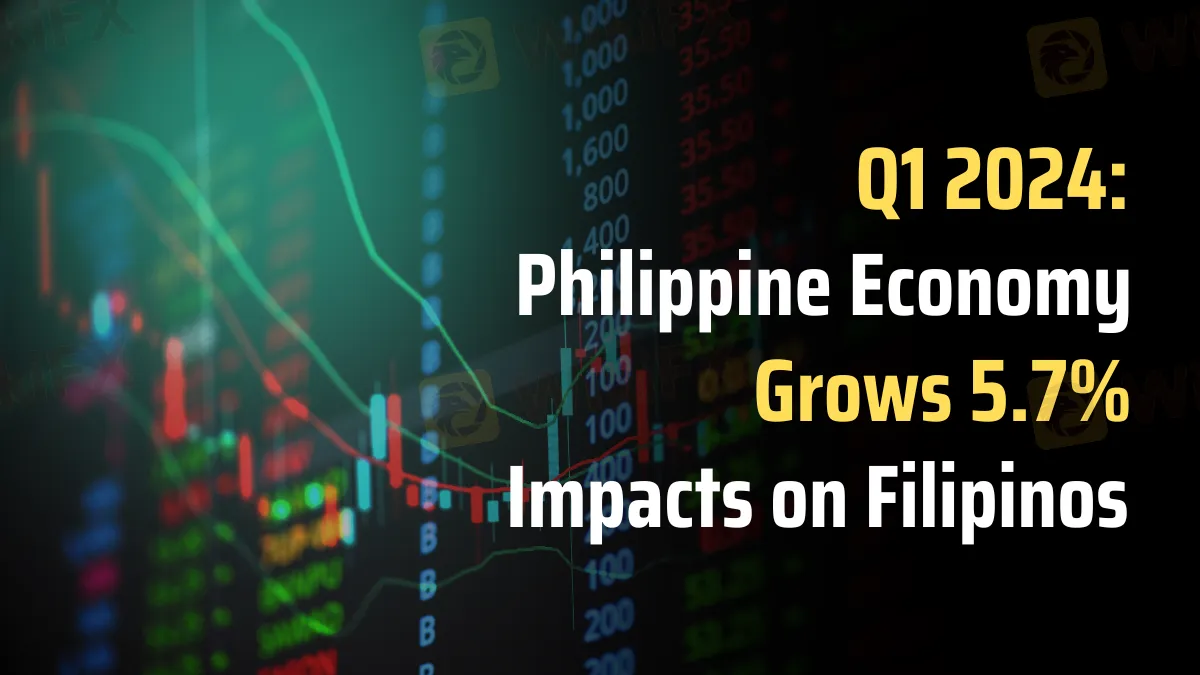简体中文
繁體中文
English
Pусский
日本語
ภาษาไทย
Tiếng Việt
Bahasa Indonesia
Español
हिन्दी
Filippiiniläinen
Français
Deutsch
Português
Türkçe
한국어
العربية
Q1 2024: Philippine Economy Grows 5.7%, Impacts on Filipinos
Abstract:Q1 2024 saw the Philippine economy grow by 5.7%, slightly below expectations amid high inflation and interest rates. Explore the varied impacts on Filipinos' daily lives.

In the first quarter of 2024, the Philippine economy grew 5.7%, less than the 5.9% growth that economists had predicted. Notwithstanding difficulties brought forth by ongoing high inflation and high interest rates, the growth rate in the January–March quarter was nevertheless better than the revised 5.5% growth in the last quarter of 2023.
Given the outside economic headwinds, the Philippine Statistics Authority said that the economy performed well in the first quarter. That gain, meanwhile, is less than the 6.4% increase seen in the same time frame the previous year.

BusinessWorld experts, who had earlier predicted somewhat higher growth, noted that several global economic factors, including fluctuating commodity pricing and geopolitical upheaval, affected economic activity in the Philippines.
Perhaps the central bank's persistence in maintaining high interest rates to control inflation limited more aggressive corporate investments and consumer spending. The pace of inflation, which has been affecting living expenses, is still a big concern for policymakers.
The industries' fortunes were varied; although manufacturing and services contributed significantly to GDP, agriculture's growth was sluggish because of bad weather and supply chain interruptions.
Citing projected gains in the state of the world economy and the completion of existing infrastructure projects that are expected to increase output and consumption, the administration is still upbeat about reaching its full-year economic growth objective.
How does this update impact the lives of Filipinos?
Though less than projected, the Philippines' 5.7% GDP growth in the first quarter of 2024 has several direct and indirect effects on Filipinos' lives. The following is a list of important ways that this economic performance affects people and families nationwide:
Jobs: The creation of jobs often follows economic expansion. Though the increase was less than expected, it nonetheless points to some degree of development in industries like manufacturing and services, which might result in additional job possibilities. If growth decelerates, the rate of job creation may be insufficient to eliminate underemployment and unemployment by a significant margin.
Cost of Living and Inflation: The Philippines' economy is growing, yet inflation is still rather high. The typical Filipino would find that their daily expenses for food, transportation, and utilities would rise, which would strain family finances. Rising interest rates will make borrowing money to combat inflation more expensive, which will be detrimental to households and might deter new investment.
Spending and consumer confidence: Spending by consumers influences economic growth. When growth either matches or exceeds expectations, spending may increase and confidence may as well. But should growth be insufficient, as it was in this instance, prudent spending may follow, which would impede the economic recovery even more.
Government Services & Spending: The state of the economy affects government incomes and its capacity to finance infrastructure projects and public services. Slowing down growth and maybe cutting down on government spending might affect vital public services like healthcare, education, and transportation.
Long-Term Economic Plans: Social programs and infrastructure expenditures are examples of long-term economic policies whose success by the government may impact its ability to meet its full-year economic goals. Should the slower-than-expected growth continue, objectives and budgetary policies could need to be adjusted.
While there is indication that the economy is expanding based on the overall growth rate, the sluggish pace and enduring challenges such as inflation and high interest rates could potentially diminish the advantages that Filipino citizens enjoy in their daily lives and prospects.

Disclaimer:
The views in this article only represent the author's personal views, and do not constitute investment advice on this platform. This platform does not guarantee the accuracy, completeness and timeliness of the information in the article, and will not be liable for any loss caused by the use of or reliance on the information in the article.
Read more

OctaFX Back in News: ED Attaches Assets Worth INR 134 Cr in Forex Scam Case
The Enforcement Directorate (ED) in Mumbai has attached assets worth around INR 131.45 crore. This included a luxury yacht and residential properties in Spain. Read this interesting story.

Oil Prices Stay Firm on Solid US Jobs Data
Oil prices stayed firm this week as the US labour department posted a better-than-expected payroll data in June 2025. Read this news in detail.

US Jobs Data Out: Boom in Government Sector, Not So in Private Sector
Jobs grew unexpectedly in June 2025 as per the data released from the US Labor Department. However, the government sector contributed more than half to the non-farm payroll. Read this to find out why private sector struggles to add jobs in the US.

FIBO Group MT5 Cent Account with Ultra-Leverage up to 1:5000 for Beginners
FIBO Group's MT5 Cent account offers a low-deposit Forex trading account with ultra-high leverage up to 1:500 for testing strategies on MetaTrader 5.
WikiFX Broker
Latest News
He Thought He Earned RM4 Million, But It Was All a Scam
CryptoCurrency Regulations in India 2025 – Key Things You Should Know
OctaFX Back in News: ED Attaches Assets Worth INR 134 Cr in Forex Scam Case
Trump inaugural impersonators scammed donors out of crypto, feds say
Ethereum is powering Wall Street's future. The crypto scene at Cannes shows how far it's come
Forex Hedging: Is It a Trader’s Safety Net or Just an Illusion?
US debt is now $37trn – should we be worried?
OPEC+ members agree larger-than-expected oil production hike in August
Top Wall Street analysts are pounding the table on these 3 stocks
Dukascopy Ends EOS/USD Trading Amid Liquidity Issues
Currency Calculator


